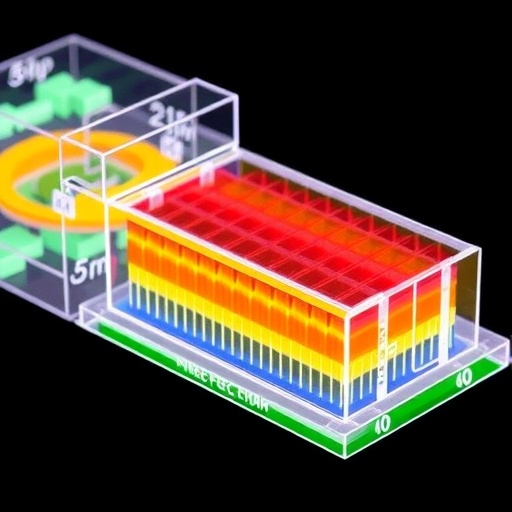In the rapidly evolving realm of energy conversion technologies, proton exchange membrane fuel cells (PEMFCs) stand at the forefront due to their high efficiency and low environmental impact. The need for optimizing their operational parameters has never been more crucial. A recent groundbreaking study by Aljaidi, Jangir, Arpita, and their colleagues introduces a novel approach to this challenge by employing an innovative educational competition optimizer. This method promises to enhance the precision of parameter optimization in PEMFCs, which could significantly advance the field of clean energy.
PEMFCs utilize a proton-conductive membrane to facilitate the conversion of chemical energy into electrical energy, a process that generates only water as a byproduct. The operational performance of these fuel cells is significantly influenced by various parameters including temperature, pressure, and reactant flow rates. The researchers recognized that achieving optimal configurations for these parameters is essential for maximizing performance and longevity of the fuel cells. Their study proposes an educational competition optimizer, a method inspired by the experiential learning process seen in competitive educational settings.
The educational competition optimizer leverages the principles of competition and collaboration found in educational frameworks to iteratively explore possible solutions. By simulating this competition, the optimizer generates multiple candidate solutions that are evaluated based on their performance in parameter optimization. This approach allows for a more dynamic and adaptive exploration of the parameter space, contrasting sharply with traditional optimization techniques which can be linear and less responsive to complex interdependencies among parameters.
One of the standout features of this new optimizer is its ability to integrate diverse functions that mimic the learning behavior of participants in educational competitions. For instance, it incorporates aspects of peer feedback and cooperative learning, which enhance the optimizer’s efficiency in finding optimal solutions. The researchers meticulously designed experiments comparing their optimizer against several conventional optimization algorithms. The results were compelling, illustrating that their proposed method outperformed others in terms of convergence speed and accuracy.
The paper articulates how the innovative optimizer was applied specifically to the operational parameters of PEMFCs. By fine-tuning these parameters, the researchers managed to enhance the overall performance metrics of the fuel cells. This advancement not only delivers immediate benefits in energy generation efficiency but also paves the way for the next generation of fuel cell technologies that are more environmentally friendly and cost-effective.
Furthermore, the significance of this research extends beyond the immediate implications for fuel cell efficiency. The educational competition optimizer framework can potentially be adapted to other fields within engineering and science, showcasing the versatility of this approach. For instance, it could be utilized in optimizing designs and operations in various renewable energy systems, chemical reaction engineering, or even system management in logistics and operations research.
In this study, the authors delve deep into their methodology, providing an extensive analysis of the algorithm’s performance and a thorough discussion on its potential extensions. They emphasize the need for interdisciplinary approaches when tackling complex optimization problems, advocating for greater collaboration between researchers from different fields to stimulate innovation.
The innovative nature of this research has significant implications for both academia and industry. Renewable energy sectors are increasingly looking for cutting-edge solutions to meet growing energy demands while minimizing environmental impacts. By incorporating advanced computational strategies such as the educational competition optimizer into the design and operation of fuel cells, stakeholders can achieve better outcomes in terms of efficiency and sustainability.
This research also raises important discussions regarding the future of educational methodologies in engineering and scientific research. As optimization problems become increasingly complex, the blend of educational principles with computational strategies stands to create a new paradigm in problem-solving. The educational competition optimizer not only serves as a technical tool but also embodies a novel conceptual approach that could influence future research methodologies.
The authors articulate that while their findings are significant, the journey does not end here. Ongoing research is needed to further refine the educational competition optimizer and test its applicability across various domains. They encourage future researchers to build on their framework by exploring new dimensions of this approach, potentially transforming it into a powerful tool for solving some of the most pressing challenges in science and technology today.
In conclusion, this study by Aljaidi, Jangir, Arpita, and their team marks a pivotal moment in the optimization landscape for proton exchange membrane fuel cells. Through the lens of an educational framework, they not only provide a more effective means of refining operational parameters but also challenge traditional optimization methodologies. The implications of their work extend far beyond PEMFCs, opening doors to innovative solutions across multiple industries facing complex optimization challenges.
As research continues in this area, the intersection of academia, technology, and innovative methodologies will be crucial. This study not only highlights a significant advancement in fuel cell technology but also serves as a reminder of the power of creativity and interdisciplinary collaboration in driving forward the energy solutions of the future.
Subject of Research: Optimization techniques for proton exchange membrane fuel cells
Article Title: A novel educational competition optimizer for precise parameter optimization in proton exchange membrane fuel cells
Article References:
Aljaidi, M., Jangir, P., Arpita et al. A novel educational competition optimizer for precise parameter optimization in proton exchange membrane fuel cells.
Ionics (2025). https://doi.org/10.1007/s11581-025-06568-8
Image Credits: AI Generated
DOI: https://doi.org/10.1007/s11581-025-06568-8
Keywords: Proton exchange membrane fuel cells, optimization, educational competition, parameter optimization, clean energy technology.




